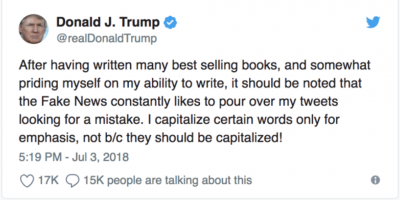When to Use Pour and Pore
President Trump took to his Twitter account to tweet a defense of his intentional capitalization of common nouns. As reported by Politico, President Trump tweeted, “After having written many best selling books, and somewhat priding myself on my ability to write, it should be noted that the Fake News constantly likes to pour over my tweets looking for a mistake. I capitalize certain words only for emphasis, not b/c they should be capitalized!”
It seems that a number of recent articles analyzing his arbitrary capitalization may have penetrated the president’s notoriously thin skin, such as the May 28 Chicago Tribune article by Alan Levinovitz.
However, grammarians largely ignored Trump’s defense of his capitalization “for emphasis” and focused on two other errors.
Tweeters pointed out that President Trump should have tweeted, “pore over,” which means 1. “to read or study with steady attention or application; 2. to gaze earnestly or steadily; or 3. to meditate or ponder intently (usually followed by over, on, or upon), rather than his use of “pour over,” which means to “to send (a liquid, fluid, or anything in loose particles) flowing or falling, as from one container to another, or into, over, or on something” (dictionary.com).
Additionally, English teachers chimed in about the misspelling of the compound word, bestselling. President Trump tweeted “best selling,” instead. President Trump frequently misuses hyphens, as in his takedown (not take-down) of Meryl Streep’s comments at the 2017 Golden Globes. President Trump tweeted, “over-rated,” instead of the correct overrated to describe Streeps’ acting skills.
Additional tweets continue to pour in, including 3 tweets from “Harry Potter” author and frequent Trump-critic, J.K. Rowling. According to Time, Rowling tweeted, “ha” 501 times in 3 successive tweets, commenting in one of them that “someone told him how to spell ‘pore.’” In another tweet, the author sarcastically referred to President Trump as the “Gratest Writer on earth,”
An hour later, the pour had been corrected to pore; however, the compound word, bestselling, remained as best selling.
Interesting to note: Microsoft Word’s spell checker highlights the error, best selling, but the program’s grammar and usage checker does not suggest a correction for the misuse of the word pour.
*****

Pennington Publishing Grammar Programs
Teaching Grammar, Usage, and Mechanics (Grades 4, 5, 6, 7, 8, and High School) are full-year, traditional, grade-level grammar, usage, and mechanics programs with plenty of remedial practice to help students catch up while they keep up with grade-level standards. Twice-per-week, 30-minute, no prep lessons in print or interactive Google slides with a fun secret agent theme. Simple sentence diagrams, mentor texts, video lessons, sentence dictations. Plenty of practice in the writing context. Includes biweekly tests and a final exam.
Grammar, Usage, and Mechanics Interactive Notebook (Grades 4‒8) is a full-year, no prep interactive notebook without all the mess. Twice-per-week, 30-minute, no prep grammar, usage, and mechanics lessons, formatted in Cornell Notes with cartoon response, writing application, 3D graphic organizers (easy cut and paste foldables), and great resource links. No need to create a teacher INB for student make-up work—it’s done for you! Plus, get remedial worksheets, biweekly tests, and a final exam.
Syntax in Reading and Writing is a function-based, sentence level syntax program, designed to build reading comprehension and increase writing sophistication. The 18 parts of speech, phrases, and clauses lessons are each leveled from basic (elementary) to advanced (middle and high school) and feature 5 lesson components (10–15 minutes each): 1. Learn It! 2. Identify It! 3. Explain It! (analysis of challenging sentences) 4. Revise It! (kernel sentences, sentence expansion, syntactic manipulation) 5. Create It! (Short writing application with the syntactic focus in different genre).
Get the Diagnostic Grammar, Usage, and Mechanics Assessments, Matrix, and Final Exam FREE Resource:
![]()
Get the “To Be” Verbs Posters FREE Resource:
![]()
Grammar/Mechanics, Literacy Centers, Spelling/Vocabulary, Writing
